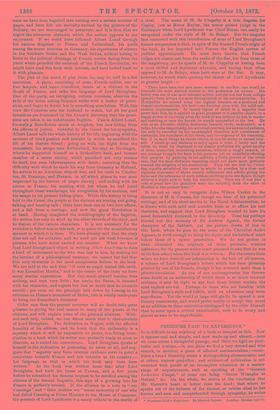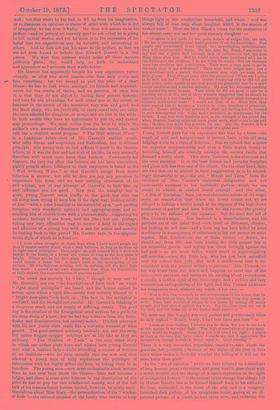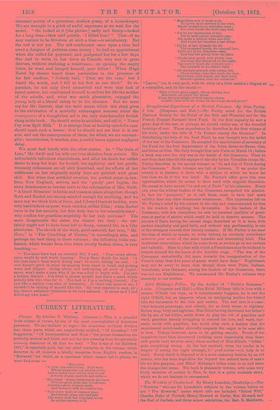PREMIUMS PAID TO EXPERIENCE.*
IT is difficult to say anything of a book so unequal as this. Now it appears real and simple, and now made-up and absurd,—here we come across a thoughtful passage, and there we light on plati- tudes and truisms,—in one place we fled a very shrewd and wise remark, in another, a piece of affected sentimentalism ;—some- times a broad liberality seems a distinguishing characteristic, and at others, narrow prejudice ; and evidence of cultivation is not unmixed with proofs of an incomplete education or a narrow range of acquaintances, such as speaking of the "German Lutharian Chapel," of some one being "Senior 'Wrangler at Oxford," &c. On the whole, we arrive at the conclusion that Mr. Garrett's heart is better than his head; that where he speaks out of the fullness of the former, or relates what he has known and seen and comprehended through sympathy, he writes
Premium Paid to Experience. By Edward Garrett. London: Stratum and Co.
well; but that where he has had to fill up from his imagination, or to discourse on opinions or states of mind with which he is out of sympathy, he has done it badly. He does not assure us in his preface—and on perusal we scarcely need to ask—that he is going to tell us real stories, and yet he hints it in the expression of his belief that his experiences may be valuable and interesting to others. And he does not put his name to the preface, so that we are not even bound to believe that Edward Garrett is a real person. We wish that authors would make all these matters perfectly plain ; they would help us both to understand and appreciate and estimate their works better.
Mr. Garrett has apparently bought his own experience rather cheaply, as after two short lessons—the first only nearly cost ..e1 him something ; for the second he paid the price of a short
illness—he has to look about amongst his friends and acquaint- ances for the results of theirs, and we perceive at once how
it is that they do not object to having their private histories laid bare for our advantage, for each either was at the outset, or becomes in the course of the narrative, very wise and good, and the black sheep, who are inevitable to every moral tale, are either the ones selected for slaughter, or escape and are lost in the wilds ; in both events they have no appearance to put in, and cannot stay proceedings. We must notice first the tales in which tha author's own assumed adventures illustrate the moral, for each tale has a distinct moral purpose. "The Well without Water" is a handsome fellow-clerk of Mr. Garrett's earliest youth, who talks Byron and scepticism and Radicalism, but is without principle ; this young man at last seduces Garrett to the theatre, which, as it was the first and last visit of his life, he very naturally describes with much more force than fairness. Fortunately for Garrett, the very day after this heinous sin has been committed, sighty pounds which belonged to their employers is found in the "Well without Water," so that Garrett's escape from moral infection is narrow ; but still he does not pay any premium to experience this time, and we hear nothing afterwards of his evil adviser, nor of any attempt of Garrett's to look him up and influence him for good. Now that the naughty boy is gone, young Garrett takes kindly to the good boy who has all along been trying to keep him in the right way, looking mildly at him "with a quiet humility in his sorrowful eyes," and quoting Scripture with wonderful aptitude and appropriateness, and re- minding him of church-time with a pleasant smile ; suggesting his mother's feelings if she knew, and the like ; but not, perhaps, taking any very efficacious way to secure a hold on the regard and affection of a young boy with a zest for action and novelty. In looking back to this period Mr. Garrett says, in the epigram- matic style of which he is fond :—
"I have often thought of those days when I have heard people say that it cannot matter much what a man believes, so long as he lives up to right moral principles. They might as well remark that it does not xnatter if the beams of a house are rotten, so long as the door-plate is bright. Where will be the door-plate when the house falls ? A hazy creed means a mazy life. A man's faith is the mainspring of his actions. He who believes nothing will do nothing, till the devil finds him work. I record as my own experience that when the foundations of faith rocked, the superstructure of practice reeled."
The creed can scarcely be "hazy," though it may not be Mr. Garrett's, nor can "the foundations of faith rock" on which "right moral principles" are based, and the beams cannot be rotten upon which a right life—surely very unfairly likened to a "bright door-plate "—ia built up. The fact is, the metaphor is confused, and the thought not careful. Mr. Garrett is thinking of a dangerous creed, and not simply of differing creeds. The good boy is the creation of the Evangelical mind anxious for a guide for his stray sheep of a hero ; but the bad boy is drawn from life, fierce, flashy, and demonstrative, but entirely selfish. His first interview
with his new junior clerk reads like a verbatim account of what passed. The good-natured motherly landlady, too, and the snug, but rather hugger-mugger lodgings are as life-like as they are ordinary. "The Wisdom of Fools" is the only other story
in which our author plays hero, and relates how young Garrett met with a learned lady—while attending a course of lectures at an institute—who let drop casually that she now and then allowed a young man of lofty aspirations the privileges of intercourse with her highly-gifted children, by taking them in as boarders. The young man—now more enthusiastic about lectures than he had ever been about the theatre—bites and becomes a lodger, and there is some quiet humour in the description of the price he has to pay for this intellectual society, and of the tall talk of his trancendental hostess, spoiled, however, by sickly senti- mentalities about Miss Mary—the personification of the "wisdom of fools "—the rational member of the family who strives to keep things right in this comfortless household, and whose "soul was always full of that long silent laughter which is the essence of unshed tears." Here are Mrs. Black's views for the exaltation of her almost crazy son and her quite slovenly daughter :—
"'Stephen is not made for the petty details of vulgar life,' she said. 'He has a contemplative soul, and a positive thirst for knowledge. Few people can understand these things, but, nevertheless, unfortunately, they will interfere with them. My late dear Mr. Black, I am sorry to say, had lost a great deal through lack of culture—in fact, my poor Mary takes after him. But ho would never have interfered with me in the training of our children. I do not think he would. But his brothers were less sensitive and considerate. They were a sore trial to we in the early days of my widowhood. They were both vulgar men ; just a hop merchant and a parish doctor—coarse men with no souls above their places. They always came with the parrot-cry, 'What was! going to do with my boy ?' They were always wondering why he did not get more prizes, quite unable to see that prizes are generally won by a mere coarse readiness and a slavish industry. My dear boy was ever reaching far beyond his mere lessons. Then when he did not seem to care for a bustling out-door life, one of them actually suggested that he should be apprenticed to a watchmaker ! His soaring delicate mind cramped to a common mechanical trade ! I would not hear of it. Since then, they have wanted him to become a teacher in some boarding or grammar- school. Never, whilst I can prevent it, shall my darling son be doomed to such uncongenial toil. I can make sacrifices in the present for the future. I can bear with hardship now, in the strength of the proud day when Stephen, having achieved some great work, shall come to me and say, 'Mother, you made this possible for me.' Ah ! Mr. Garrett, it is a solemn and awful thing to be the mother of a great soul."
Young Garrett pays for his experience this time by a fever—the result of cold and hunger—and is carried back to his old snug lodgings while in a state of delirium. But we submit that a desire for superior companionship and even a little boyish vanity in bettering himself are scarcely amongst the serious faults that demand a costly check. This story, however, is the cleverest and the most amusing. It is the least forced, and intrudes Scripture and pious talk less than any of the others. On the other hand, there are two that are so absurd in their exaggeration as to be exceed- ingly distasteful to us,—the one, "Wheat and Tares," from the virulence of Mrs. Cromer's righteous indignation and her inexcusable rudeness to her husband's partner, which we are meant to admire as exalted moral courage ; and the other, "A Sin of Omission," from the melodramatic nature of its tragic style, so remarkable that when the secret comes out, we are obliged to indulge a hearty laugh at the expense of the high-flown sentiments of author and hero before we can recover the gravity proper to the sadness of the occasion. But we must first tell of Mrs. Cromer's anger. Her husband is a manufacturer, and his partners are of the usual kind—not cruel or dishonest, observe, but looking to self first—and a little boy has been killed by some machinery in consequence of reluctance to lay out money on some repairs. Mrs. Cromer—in one of those scenes, not drawn, we should say, from life—has been kissing the little pauper boy in his miserable garret, and laying her cheek lovingly against the bed-post — an act most ladies would avoid as supererogatory self-sacrifice —when the little boy, who has just been animated over his calve s'-foot jelly, dies with a suddenness that is not consistent with the present writer's experience. Mrs. Cromer, on her way home from the death-bed, happens to meet one of the laissez-faire partners, and insists on his turning about ; —darkness, a candle, a sudden sight of the little corpse, and a sudden and very uncourteous extinguishing of the light, and Mrs. Cromer addresses her companion thus, without any words of her own :—
" 'Woe to him that coveteth an evil covetousness to his house, that he may set his nest on high, that he may be delivered from the power of evil ! Thou haat consulted shame to thy house by cutting off many people, and bast sinned against thy soul. For the stone shall cry out of the wall, and the beam out of the timber shall answer it.'"
We must say Mr. Knight was very patient and gentlemanly when he only replied "Really, really, I had best leave you here ":—
" '1 honour your feelings. I admire you for them, but you do not look at this matter in the right light. The logical conclusion of your senti- ments would be beggary. Some day you will own I am right. I might be hurt at the tone you have taken towards me, but I appreciate the
sympathies, though mistaken, which cause it. Good evening.'"
There is a very one-sided, superficial, impulsive tone about the generous but youthful advocacy of the claims of the poor in this story which makes it doubtful whether the telling of it will not do more harm than good.
In the "sin of omission" which we have referred to, a merchant of long descent, great cultivation, and great wealth, goes about with a secret trouble, and the change of a man's expression at the sight of unexpected horrors "is the nearest to the change that always fell on Hubert Ravel's face as he turned himself back to his solitude."
He lives, unmarried, in the heart of the city, and in a meagrely furnished dark parlour of his sumptuous house, gazing at an ill- painted picture of a youth he had never seen, and enduring the constant society of a querulous, shallow gossip of a housekeeper. We are wrought to a pitch of awful eagerness as we wait for the secret. "He looked at it [the picture] sadly and firmly—looked for a long time—then said quietly, 'I killed him!'" This—if we may venture to be frivolous at such a time—is satisfactory. But the end is not yet. The self-condemner once upon a time had owed a designer of patterns some money ; he had an appointment when she called for payment, and postponed her for a few days. She had to write to her lover in Canada, who was in great distress, without enclosing a remittance ; on opening the empty letter, he went and hanged himself, poor fellow ! When Hugh Ravel by chance heard these particulars in the presence of his fair creditor, "Nobody said, 'Thou art the man,' but I heard the words, and I fell at her feet as one dead." In re- paration, he not only lived unmarried and wore that look of secret sorrow, but condemned himself to endure for life the mother
of the suicide, and, what was much pleasanter, engaged the young lady at a liberal salary to be his almoner. But we must say for Mr. Garrett, that the tacit assent which this story gives to the cultivation of a morbidly extravagant remorse about the consequences of a thoughtless act is the only unredeemably foolish thing in his book. He should write its antidote, and call it, "Never Cry over Spilt Milk." It is strange that so healthy-minded a man should teach such a lesson ; that he should not see that it is our acts, and not the consequences of them, for which we are account- able; nevertheless, it teaches, also, a useful lesson against negligent delay.
We must deal briefly with the other stories. In "The Gain of Loss," Mr. Swift and his wife are true sketches from nature. His indomitable infectious cheerfulness, and after his death her selfish desire to keep her boys for herself, her sophistry, and her gentle, womanly refinement are all ably described, and the effects of her selfishness on her originally manly boys are painted with great skill. But when that artificial creation, the perfect sister-in-law, from New England, arrives, and the 'goody' part begins, the story deteriorates in inverse ratio to the reformation of Mrs. Swift. "A Good Situation" is feeble and common-place altogether, though Rath and Rachel are strong-minded enough for anything, and we must say we think both of them, and Edward Garrett besides, were very hard indeed on poor, weak-minded, selfish Eliza ; when Rachel came in for her annuity, her first duty was to her miserable sister ; why confine her guardian-angelship to her rich mistress ? The more disagreeable the sister, the clearer the duty ; she cer- tainly ought not to have been left to decay, uncared for, in a City almshouse. The sketch of the weak, good-natured, fast man, " Mr. Hare," in "The Crackling of Thorns," is exceedingly able, and perhaps the best thing in these volumes ; the following little con- fession, which breaks from him when utterly broken down, is very touching :—
" Yon must have had an eventful life,' I said. Your many adven- tures would be well worth hearing.' Percy Hare shook his head. A life that hasn't been worth living can't be worth telling,' he said. 'A coin doesn't grow in value by passing from hand to hand, and getting worn and clipped. Going about, and undergoing all sorts of experi- ences, won't make a man wise if he was a fool to begin with. Fin just a failure, Garrett. I've lived to please myself, and that's a mark which nobody hits who tries for it. The fact is I'm a nothing, Garrett. I'm just like a useless coat-skin of humanity. If there was more of me, I shouldn't be talking of myself like this. My very remorse is easy, sir ; but there's awfullest bitterness in its very easiness. It seems as if I had killed my own heart.' "




































 Previous page
Previous page